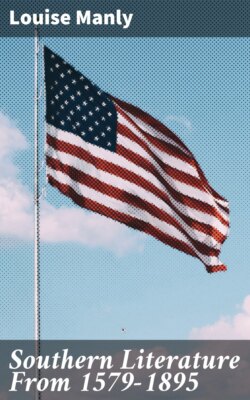Читать книгу Southern Literature From 1579-1895 - Louise Manly - Страница 20
На сайте Литреса книга снята с продажи.
OUR RIGHT TO THOSE COUNTRIES, TRUE REASONS FOR PLANTATIONS, RARE EXAMPLES.
ОглавлениеTable of Contents
(From Advertisements for the Inexperienced.)
Many good religious devout men have made it a great question, as a matter in conscience, by what warrant they might goe to possesse those Countries, which are none of theirs, but the poore Salvages.
Jamestown, Va.
The first permanent English settlement in America.
Which poore curiosity will answer it selfe; for God did make the world to be inhabited with mankind, and to have his name knowne to all Nations, and from generation to generation: as the people increased, they dispersed themselves into such Countries as they found most convenient. And here in Florida, Virginia, New-England, and Cannada, is more land than all the people in Christendome can manure [cultivate], and yet more to spare than all the natives of those Countries can use and culturate. And shall we here keepe such a coyle for land, and at such great rents and rates, when there is so much of the world uninhabited, and as much more in other places, and as good or rather better than any wee possesse, were it manured and used accordingly?
If this be not a reason sufficient to such tender consciences; for a copper knife and a few toyes, as beads and hatchets, they will sell you a whole Countrey [district]; and for a small matter, their houses and the ground they dwell upon; but those of the Massachusets have resigned theirs freely.
Now the reasons for plantations are many. Adam and Eve did first begin this innocent worke to plant the earth to remaine to posterity; but not without labour, trouble, and industry. Noah and his family began againe the second plantation, and their seed as it still increased, hath still planted new Countries, and one Country another, and so the world to that estate it is; but not without much hazard, travell, mortalities, discontents, and many disasters; had those worthy Fathers and their memorable offspring not beene more diligent for us now in those ages, than wee are to plant that yet unplanted for after-livers: Had the seed of Abraham, our Saviour Christ Jesus and his Apostles, exposed themselves to no more dangers to plant the Gospell wee so much professe, than we; even we our selves had at this moment beene as Salvages, and as miserable as the most barbarous Salvage, yet uncivilized.
The Hebrewes, the Lacedemonians, the Goths, Grecians, Romans, and the rest; what was it they would not undertake to enlarge their Territories, inrich their subjects, and resist their enemies? Those that were the founders of those great Monarchies and their vertues, were no silvered idle golden Pharisees, but industrious honest hearted Publicans; they regarded more provisions and necessaries for their people, than jewels, ease, and delight for themselves; riches was their servants, not their masters; they ruled as fathers, not as tyrants; their people as children, not as slaves; there was no disaster could discourage them; and let none thinke they incountered not with all manner of incumbrances; and what hath ever beene the worke of the best great Princes of the world, but planting of Countries, and civilizing barbarous and inhumane Nations to civility and humanity; whose eternall actions fils our histories with more honour than those that have wasted and consumed them by warres.
Lastly, the Portugals and Spaniards that first began plantations in this unknowne world of America till within this 140. yeares [1476–1616], whose everlasting actions before our eyes, will testifie our idlenesse and ingratitude to all posterity, and neglect of our duty and religion we owe our God, our King, and Countrey, and want of charity to those poore Salvages, whose Countries we challenge, use and possesse: except wee be but made to marre what our forefathers made; or but only tell what they did; or esteeme our selves too good to take the like paines where there is so much reason, liberty, and action offers it selfe. Having as much power and meanes as others, why should English men despaire, and not doe as much as any? Was it vertue in those Hero[e]s to provide that [which] doth maintaine us, and basenesse in us to do the like for others to come? Surely no: then seeing wee are not borne for ourselves but each to helpe other; and our abilities are much alike at the howre of our birth and the minute of our death: seeing our good deeds or bad, by faith in Christs merits, is all wee have to carry our soules to heaven or hell: Seeing honour is our lives ambition, and our ambition after death to have an honourable memory of our life; and seeing by no meanes we would be abated of the dignitie and glory of our predecessors, let us imitate their vertues to be worthily their successors; or at least not hinder, if not further, them that would and doe their utmost and best endeavour.
